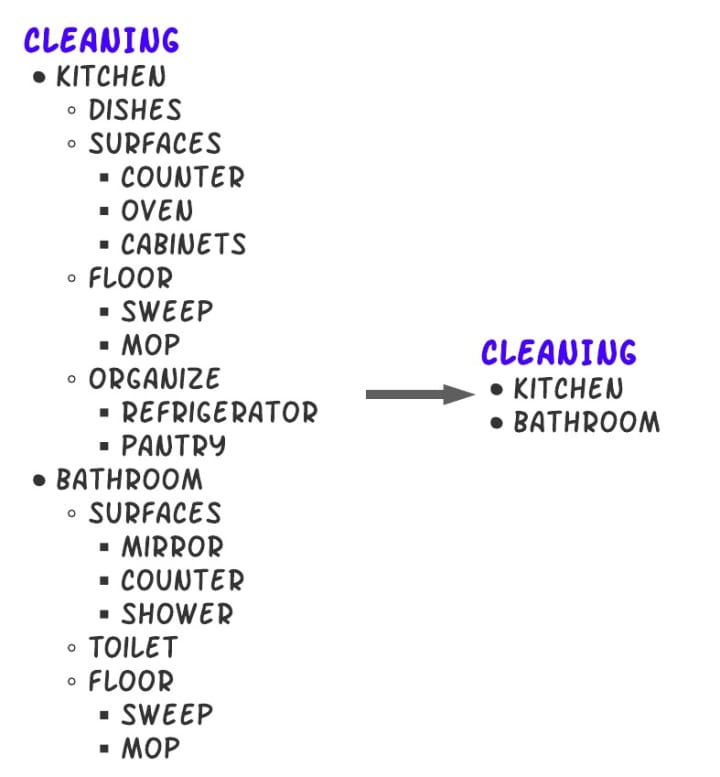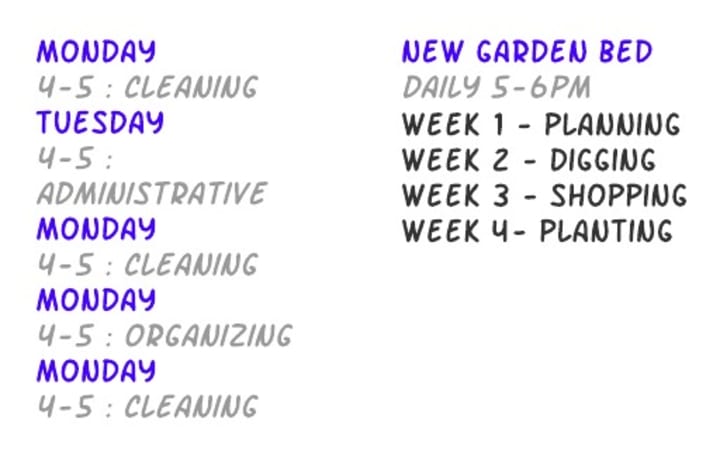Intuition-Driven Organization
Tips for Chronic Over-Planners

I identified as an organized person until 2020 tore through like a tornado, upending all my self-delusions. When my family was suddenly plunged into the work-from-home, learn-from-home, cook-every-meal-at-home life, everything turned into a chaotic mess.
How could this be? I'm practically known for my lists! I carry a pencil with me everywhere. No task is too menial for me to break down into steps. Give me a box of items, and I can sort them into two, five, ten categories. I'm a project manager by profession, for goodness sake!
But two working adults, two children, and one world-wide pandemic had me questioning my organizational aptitude. I accepted that my house would be messier, but what I hadn't accounted for was how overwhelmed I would feel. I wrote and rewrote lists, schedules, and chore charts. In search of the perfect solution for the increased use of electronics, toys, and art supplies, I cycled through multiple storage approaches. I was in a frenzied revision loop, a modern-day Winston Smith for the 2020 dystopia. We've always stored the paint in the closet!
For a while, I deflected blame onto the pandemic. But after a few months of soul searching, I had to admit this was a magnification of an old pattern, not a new problem. It's common for me to spend more time making lists than acting on them. I've received professional feedback that I over-complicate projects and processes. Despite trying most major productivity apps, none has held my attention for more than a few months.
I decided to examine those times when I was productive. What factors were present? What mindset did I have? What process did I actually use?
I remember the night it dawned on me. The kids were in bed. I was relaxing in my room, doodling in my journal, and listening to music. I felt so at ease. Like storm clouds clearing, my mind served up a truth that was so obvious, I wasn't sure how I ever thought otherwise.
I'm at my most productive when I work intuitively, not structurally.
When I run out of time to indulge in more planning and have to jump into action, I'm always pleasantly surprised with how much I get done. My most persistent storage solution is an over-the-door shoe hanger that I bought on a whim, which has housed my toiletries for almost ten years. My house stays cleanest when I lock myself in a room with some music and pick up whatever I see next.
My lists, calendars, apps, and charts weren't helping me be productive. They were just helping me feel productive.
I started to prioritize sustainability over exactness. My motto became if I can't maintain it, it's still too complicated.
There's nothing wrong with detailed planning. If you're someone who thrives on it, this advice is not for you! But if you're like me and find that it impedes your productivity instead of propelling it, read on for some of my best tips.
Level Up

Tip number one is to level up by planning one or two levels higher than you ordinarily would.
For those of us with analysis paralysis, it can be tempting to continue breaking goals down into smaller and smaller chunks. The illusion of productivity is satisfying, and if we ever get around to doing the work, there’s so much to check off!
But it’s easy to get stuck in the details and start trying to solve problems that will probably work themselves out. Do I need to know exactly which storage boxes I’m going to buy before heading to the store, or will the dimensions be enough? Do I need a full list of surfaces in the bathroom, or will a Wipe Surfaces task suffice?
I’ve found that my intuition is a lot more powerful than I give it credit for. By going up a few levels in my planning, I spend less time paralyzed by possibilities and more time getting work done.

Time Block
Tip number two is to time block by setting aside chunks of time with a high-level theme or goal.
Before the pandemic, I planned everything on the calendar. I would track due dates for my goals, but I didn’t trust myself to figure out how to meet those deadlines. So I broke my goals into tasks and spread them across the calendar.
The problem is that I was often unclear which items were truly time-sensitive. I would get in the habit of shifting tasks I didn’t feel motivated to do, because I knew that the dates were arbitrary. As with any system, it only works if you work it, and this level of scheduling did not work.
My new approach is to set aside consistent time blocks to tackle my responsibilities. The time blocks have broad themes, like cleaning, administration, and organization. When I take on a new project, the theme changes as the project progresses.
Embrace Shortcuts
Tip number three is to embrace shortcuts by formalizing what you do when rushed.
It can be hard to separate our ideal organizational personality from what's attainable. To overcome this, start with what you do when you've run out of time. For example, I'm notorious for throwing all uncategorized items into a laundry basket and calling it a day. Those baskets are sometimes out of commission for months, but they're the first place I look when something is missing.
Lately, I've purchased large, aesthetically pleasing storage boxes for each of the main rooms. They are the landing place when my house needs a quick pick-up. I don't plan when I'll go through them - if one is obnoxiously full, I tackle it when the mood strikes me. Time blocking helps make this more frequent.
Like all good Millenials, I struggle with imposter syndrome. I can feel immature when I don't organize the way I see on Pinterest or how my parents did when I was growing up. Sometimes, I feel lazy when I see my junk boxes. But there are no rules for the right way to organize! My boxes keep my space clear and my mind calm. The goal is maintenance, not prestige.
Be Realistic
Tip number four is to be realistic by gut-checking solutions against your own personality.
On a recent visit with my parents, my mom showed me that she split my daughters' hair accessories into boxes per color family. Contrast that with my system, where hairbands, headbands, bows, and clips are crowded together like a pre-pandemic parking garage.
My mom's system has many advantages. It's easy for my daughters to see their options and match their outfits. My daughters can use it without dumping everything out on the floor and pawing through their options. But there's one major disadvantage - I could never keep it up.
In a perfect world, the bows and bands would be put away every night in their proper homes. But my kids and I are not robots, and our life is far from clockwork. The system works great for my mom, but it would only bring anxiety and frustration to me.
I've learned that I have to be realistic and kind to myself in my quest to simplify. Some people, like my mom, naturally operate at a deeper organizational level. But for me, those boxes would be a nightmare. I would feel momentarily triumphant but ultimately overwhelmed by the maintenance. That would just lead to feelings of failure.
Final Thoughts
As we near the end of March 2021, a year since the pandemic began and eight months since my organizational epiphany, I’ve relaxed into my intuitive approach. Leveling up, using time blocks, and being realistic help me find a balance in my home and work life. As a recovering over-planner, balance is a daily struggle to maintain. But the positive impact on my mental health is worth the effort.
Remember, if you can’t maintain it, it’s still too complicated.
Happy simplifying!





Comments
There are no comments for this story
Be the first to respond and start the conversation.